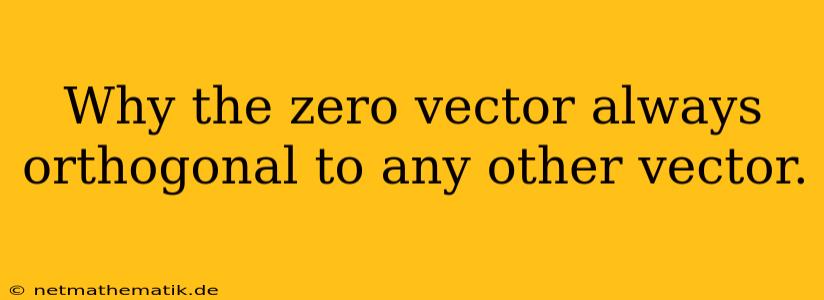In the realm of linear algebra, vectors are fundamental entities that represent direction and magnitude. One fascinating concept is the zero vector, denoted by 0, which holds a unique position in the vector space. It is defined as the vector with all components equal to zero. A particularly intriguing property of the zero vector is its orthogonality to any other vector. This article delves into the reasons behind this fundamental property and explores its implications in various mathematical applications.
The Definition of Orthogonality
Before diving into the relationship between the zero vector and orthogonality, it's crucial to understand what orthogonality means in the context of vectors. Two vectors are considered orthogonal if their dot product is zero. The dot product, also known as the scalar product, is a mathematical operation that combines two vectors to produce a scalar value.
For two vectors u and v, their dot product is defined as:
u ⋅ v = ||u|| ||v|| cos θ
where:
- ||u|| and ||v|| are the magnitudes of vectors u and v, respectively.
- θ is the angle between the vectors.
When θ = 90°, cos θ = 0, indicating that the dot product of two orthogonal vectors is always zero.
The Zero Vector and its Dot Product
Now, let's consider the zero vector and its dot product with any other vector v. The dot product of the zero vector with v can be written as:
0 ⋅ v = ||0|| ||v|| cos θ
Since the magnitude of the zero vector is zero (||0|| = 0), the entire expression becomes:
0 ⋅ v = 0 × ||v|| cos θ = 0
Therefore, the dot product of the zero vector with any other vector v is always zero, regardless of the magnitude or direction of v.
Implications of Orthogonality
The orthogonality of the zero vector to any other vector has several important implications:
-
Basis Vectors: In linear algebra, a set of basis vectors spans the entire vector space. The zero vector is orthogonal to all basis vectors, meaning it does not lie in the direction of any basis vector. This property is essential in constructing orthonormal bases, where basis vectors are mutually orthogonal and have unit length.
-
Projection: The projection of a vector v onto the zero vector is always zero. This is because the projection is defined as the component of v that lies in the direction of the zero vector, which is effectively a zero-length vector.
-
Geometric Interpretation: In geometric terms, orthogonality means that two vectors are perpendicular to each other. The zero vector can be visualized as having no direction and therefore is perpendicular to any other vector in the vector space.
-
Linear Independence: The zero vector is linearly dependent on any other vector. This is because the zero vector can be expressed as a scalar multiple of any other vector. However, the zero vector itself is not linearly independent, as it is always a linear combination of itself.
Conclusion
The property of the zero vector being orthogonal to any other vector is a fundamental concept in linear algebra with significant implications. It highlights the unique role of the zero vector in vector spaces, as a vector with no direction and zero magnitude. This property is crucial in various mathematical applications, including constructing orthonormal bases, calculating projections, and understanding linear independence. By understanding the concept of orthogonality and the special role of the zero vector, we gain deeper insights into the structure and properties of vector spaces, paving the way for further exploration of mathematical concepts.
